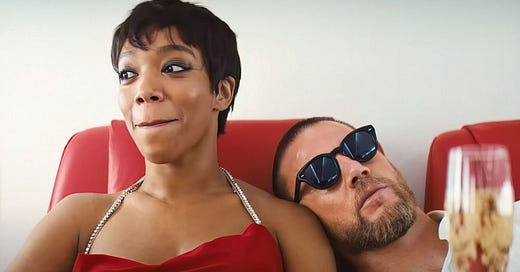I got texts from multiple people asking if I had seen Blink Twice yet. So I finally overcame internal resistance and watched it. It’s available on VOD. Spoilers, etc.
Blink Twice doesn’t really work as a horror movie. We are still this post-Get Out social justice horror trend, where the fears of marginalized identities are literally realized on the screen. Women fear being abused or murdered by men, so from Invisible Man to Men women find themselves in relationship with men turned literal monsters. Blink Twice seems at first like a part of this trend, as a woman discovers the romantic getaway with a billionaire on his private island is actually a kind of imprisonment where the women are repeatedly drugged, raped, and tortured, then drugged again so they’ll forget what was done to them.
But ultimately it fails to satisfy as horror. The social commentary is too on-the-nose, there is a squeamishness with showing the torture the women endured, and the climactic revenge spree is too unfocused to be cathartic. Because it’s left so unclear what happened when the women were drugged, who did what and why – “they are men” seems like enough of a motivation for the sexual sadism – there’s little satisfaction to their being dispatched other than the usual spectacle of blood and gore. (Had the film left ambiguity in the authenticity of the recovered memories of abuse, letting Frida’s attack on the men be less punishment and more a possibly hysterical response, that would have been a horror movie.)
So if it’s not a horror movie, what it must be is a romance. Our heroine starts the film pining for her man and by the end she is married, rich, and successful. Seen in this way, the movie “works” and satisfies expectations. As a character in Pedro Almodovar’s romantic film about a woman who falls for her stalker and kidnapper Tie Me Up! Tie Me Down! said, there’s not much difference between a horror movie and a romance these days anyway.
Blink Twice borrows the basic structure of a Cinderella story – a young woman from the lower classes is plucked from the crowd by the handsome prince/tech billionaire and elevated to his high status. Her prince, played by Channing Tatum, is literally named “King,” although instead of being the ruler of a kingdom he is a tech billionaire with a private island. (Details about Slater King’s business are as vague as the land that Cinderella’s prince ruled over.) Frida is an uninvited guest at a gala event held by King’s charitable foundation, a play on the traditional Cinderella ball. And despite being just a lowly waitress/commoner, King sees something special within Frida and chooses her to join him on his journey. That there is zero chemistry between the two lead actors is almost beside the point, it’s not necessary for the story. Instead of courtship, Frida gets sexual abuse, but the end of the story is the same: Frida has her man and a kingdom over which to reign. She doesn’t kill King as revenge, she instead uses the same drugs he used on her to control him, marry him, and keep him docile as she takes over his business.
Blink Twice only deviates from the Cinderella story by emptying Frida out of any real personality or recognizable traits. Cinderella, after all, is not a big blank; she is worthy of love because of her great kindness and goodness, especially in comparison to her sisters’ envy and spitefulness. Frida is on the other hand your typical blank slate romance lead: not very smart, not very kind, not very interesting. In romance novels, it’s understood that the vaguer you can be in establishing a female character, the more the reader can insert themselves into the action. So the protagonist is feisty but loving, warm but steely, capable but hapless. She probably falls over a lot, to indicate that while being sophisticated, she’s still relatable. (Goodness is not relatable or aspirational under capitalism.)
So Frida has “ambitions,” but she doesn’t know what she ultimately wants. People are always telling her how special and interesting she is, but the film doesn’t show her to be special or interesting. It shows her to be pretty good at painting cute little animals on manicures, and that is meant to serve as an indicator that she’s “creative.” Your typical horror heroine is a real character; she has a personality, a back story, a character, friends and family and something to live for. But the romance protagonist isn’t someone you root for, it’s someone you want to imagine yourself to be and specificity gets in the way of that.
Blink Twice is essentially a heteropessimist 50 Shades – the beautiful but listless protagonist attracts the sadistic billionaire and accesses his fortune through a domestication process. She doesn’t just acquire a husband, she gets a career out of her arrangement. In 50 Shades, billionaire Christian gives Anastasia her own publishing company. She immediately reveals herself to be a secret genius, it turns out all she needed to be successful was to be seen by a powerful man, granted an opportunity, and given all the resources she needed to flourish.
But the love of a broken man is hardly a great prize these days. So instead of getting half, Frida gets it all. At the end of Blink Twice, Frida has taken over Slater King’s fortune and is now wielding power with what we are asked to assume is great wisdom and ability. This is the new version of Happily Ever After. Despite having no business experience and no personal ambitions other than wealth and luxury, she is capable of effortlessly stepping into the role previously held by a serial abuser. And there he is, by her side, drugged into submission and a supporting position.
As Eva Illouz pointed out in Hard-Core Romance: 50 Shades of Grey, Bestsellers, and Society, much of the appeal of 50 Shades lay not in the sex but in Anastasia’s success in publishing. Women still have a lot of ambivalence about their ambitions and the consequences they might face in “masculinizing” themselves in career and desire. The fantasy, then, is not in beating out the competition to get what they want but in being seen as special and being given what is exactly right for them – like a glass slipper -- without having to do anything to get it or even be aware this is what they wanted.
The Millennial girlboss wasn’t so much a figure of ambition so much as a figure of authenticity. An empire would gather at her feet, just by her being the most authentic version of herself. The dream job wasn’t editor of Vogue – where one would have to compromise oneself to fit within the institution – but the creator of Man Repeller or Rookie. The creative Millennial woman didn’t want to write about society or war or business. She wanted to write about herself, in personal essays or autofiction or memoir. (Or, more accurately, she wanted to be seen writing rather than to do the writing itself.)
And there is nothing more authentic than suffering. If the romantic heroine rejects traditional, masculine competition, then she has to prove her worthiness in other ways. If Frida is just a waitress – a waitress we see abandoning her fellow employees at their job to mingle with the rich people they are supposed to be serving – then she has to be designated as special and different from her colleagues. So she gets a tragic backstory and the sexual abuse and torture at the hands of King and his friends. This is basically all we know about Frida, other than her inability to walk in heels.
Perhaps its failure at the box office was down to its failure to prettify the story it was telling. You can’t just say outright, I would like to profit from the trauma I’ve experienced. You have to cloak it in language of justice or say that you’re thriving in spite of what you’ve suffered. Anastasia wouldn’t be aspirational if she said outright she wanted Christian’s billions – she had to be seen as put off and made uncomfortable by the wealth and prestige. Cinderella has to love Prince Charming for who he is, not for his kingdom. Blink Twice doesn’t bother with being coy. It might be, in all its repellant literalness and obviousness, the Cinderella story for our time.
Recommended:
Patri Becus wrote for us about what it takes for a Romanian writer to find American success, but also the machinery that runs international culture.
From Bucharest to Barnes & Noble
Right before the Nobel announcement, I was trying to figure out who “Dan” was—the Romanian correspondent who went live on Swedish TV in 2009 when Romanian-born German novelist Herta Müller won the Nobel Prize in Literature. Dan is mentioned in one of Mircea Cărtărescu’s journals as preparing to speak to the Swedes in the eventuality that Cărtărescu won. I pictured this Dan, waiting around the television studios, just in case a Romanian won an international prize. “He went live for Herta Müller.”







Forever cursing Jordan Peele (and I think Carmen Maria Machado, though I haven’t read her yet) for making everyone think that they could add a dash of horror to spice up their middling plots.
I did quite enjoy The Invisible Man, though. It’s not that deep but its premise and jump scares were effective. I screamed at least once and that’s really all I ever ask for.
“Goodness is not relatable or aspirational under capitalism.” This would be an excellent theme for a gritty Cinderella reboot.
Also someone needs to figure out why third-wave feminist media is so afraid of killing men. Even in a horror movie where killing the villain should be the whole damn point. Are o ur imaginations so small that we cannot even conjure up a shadow of a Madea?